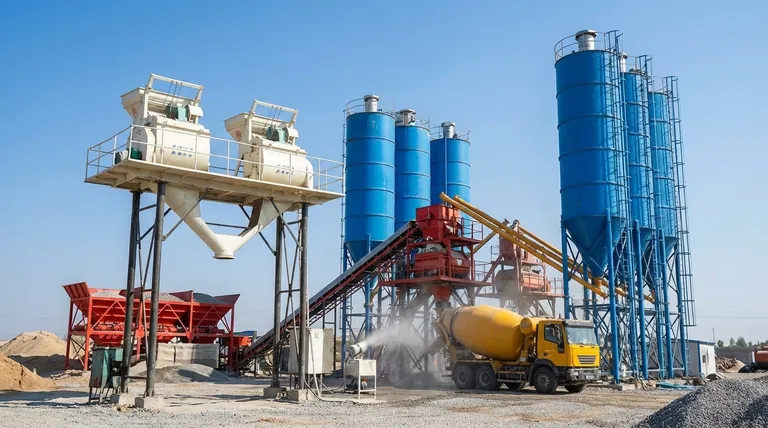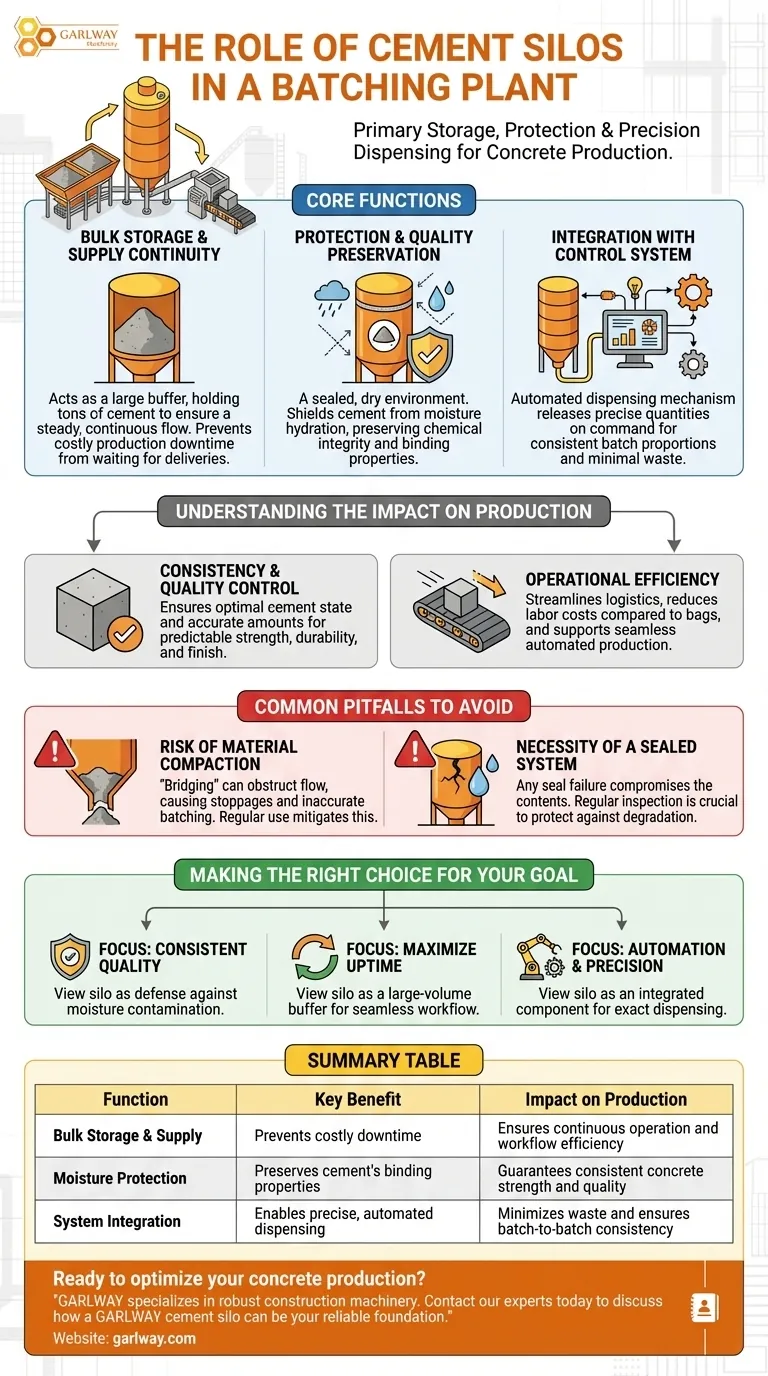At its core, a cement silo is the primary storage and protection unit for cement within a concrete batching plant. Its fundamental role is to hold large quantities of cement powder in a controlled environment, ensuring it remains dry and ready for precise dispensing, which is critical for preventing production interruptions and maintaining material quality.
A cement silo is more than just a storage container; it is an active component that safeguards the integrity of the cement and guarantees the consistent, on-demand supply required for precision-controlled concrete production.

The Core Functions of a Cement Silo
To understand the batching plant, you must first appreciate the silo's distinct contributions. Its role extends beyond simple storage into active quality control and process integration.
Bulk Storage and Supply Continuity
A plant's production rate depends on a steady flow of materials. The silo acts as a large buffer, holding tons of cement delivered in bulk.
This ensures a continuous supply is always on hand, preventing the costly downtime that would occur if the plant had to wait for new material deliveries.
Protection and Quality Preservation
Cement's primary adversary is moisture. The powder reacts with water in a process called hydration, and any premature exposure can ruin its binding properties.
A silo provides a sealed, dry and controlled environment. It acts as a critical barrier against rain, humidity, and atmospheric moisture, preserving the cement's chemical integrity until the exact moment it is needed.
Integration with the Control System
Modern batching plants are automated systems. The central control system orchestrates the mixing of ingredients with high precision to meet specific concrete recipes.
The silo is not a passive container; it is integrated directly with this system. Its dispensing mechanism releases exact quantities of cement on command, ensuring every batch has the correct proportions for consistent quality and minimal waste.
Understanding the Impact on Production
The silo's functions have a direct and significant impact on the final product and the efficiency of the entire operation.
Consistency and Quality Control
The ultimate goal of a batching plant is to produce high-quality concrete reliably. The silo is foundational to achieving this.
By preventing moisture degradation and enabling accurate dispensing, the silo ensures that the most critical binding ingredient is always in its optimal state and used in the correct amount. This leads to predictable strength, durability, and finish in the final concrete product.
Operational Efficiency
The alternative to a silo is storing cement in smaller bags, which is labor-intensive, slow, and creates more potential for waste and contamination.
Using a silo for bulk storage streamlines the entire logistical chain, reduces labor costs, and supports a seamless, automated production process. This efficiency is key to the profitability of any large-scale construction project.
Common Pitfalls to Avoid
While essential, a silo is not a "set and forget" component. Its effectiveness depends on proper management and awareness of potential issues.
The Risk of Material Compaction
If cement powder sits undisturbed for extended periods, it can compact under its own weight. This is often referred to as "bridging."
Compaction can obstruct the flow of cement from the silo's dispenser, leading to production stoppages and inaccurate batching. Regular use and proper silo design help mitigate this risk.
The Necessity of a Sealed System
The silo's most important job is to keep the cement dry. Any failure in its seals, vents, or loading systems can compromise the entire contents.
Regular inspection and maintenance are crucial to ensure the silo remains perfectly sealed against the elements, protecting your most valuable raw material from degradation.
Making the Right Choice for Your Goal
Your specific operational priority will determine which function of the cement silo is most critical to your success.
- If your primary focus is consistent product quality: View the silo as your first line of defense against moisture contamination, ensuring the cement's binding properties are never compromised.
- If your primary focus is maximizing plant uptime: The silo's role as a large-volume buffer is essential for enabling a seamless, uninterrupted production workflow.
- If your primary focus is automation and precision: See the silo as an integrated component of your control system, responsible for dispensing the exact amount of material required for perfect batches every time.
Ultimately, a properly managed cement silo is the bedrock of an efficient, reliable, and high-quality concrete batching operation.
Summary Table:
| Function | Key Benefit | Impact on Production |
|---|---|---|
| Bulk Storage & Supply | Prevents costly downtime | Ensures continuous operation and workflow efficiency |
| Moisture Protection | Preserves cement's binding properties | Guarantees consistent concrete strength and quality |
| System Integration | Enables precise, automated dispensing | Minimizes waste and ensures batch-to-batch consistency |
Ready to optimize your concrete production with a reliable cement silo solution?
GARLWAY specializes in providing robust construction machinery, including high-performance cement silos, concrete mixers, and complete batching plants. We help construction companies and contractors globally achieve maximum uptime, consistent quality, and automated efficiency.
Contact our experts today to discuss how a GARLWAY cement silo can become the reliable foundation of your batching plant.
Visual Guide

Related Products
- HZS35 Small Cement Concrete Mixing Batch Plant
- Hydraulic Concrete Mixer Machine Cement Mixing Equipment for Mixture Concrete
- JW1000 Mobile Cement Mixer Concrete Mixer Truck and Batching Plant
- HZS75 Concrete Batching Plant Cement Mixer Price Concrete Mixer Bunnings Mixing Plant
- HZS180 Ready Mix Concrete Plant for Foundations with Sand and Cement
People Also Ask
- What does the daily maintenance of a dry mortar mixing station include? A Proactive Guide to Maximize Uptime
- What are the features of the RCC batching plant for water conservancy projects? Key to High-Volume, Low-Cost Concrete
- What is the function of a concrete batching plant? Precision, Quality, and Efficiency for Your Project
- What are the advantages of ready mix concrete? Higher Quality, Efficiency & Cost Savings
- What are the common manifestations of sensor failure in concrete mixing stations? Identify & Fix Issues Fast
- How can painting cement tanks help in reducing heat radiation effects? A Simple Guide to Temperature Control
- What aspects of the vibrating screen should be checked in a concrete mixing plant? Ensure Consistent Concrete Quality & Plant Uptime
- What is the general working principle of a concrete batch plant? | Precision & Automation Explained














